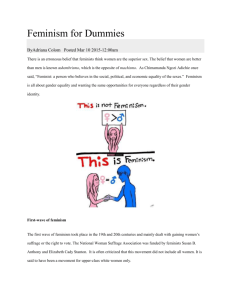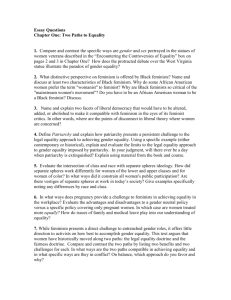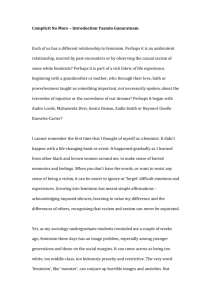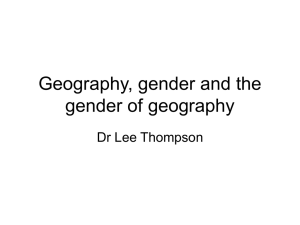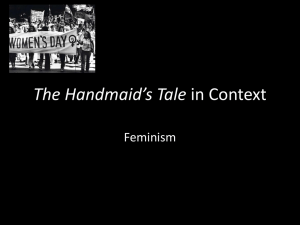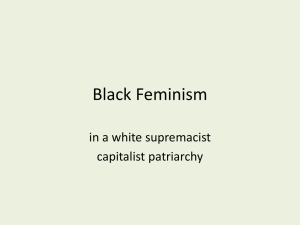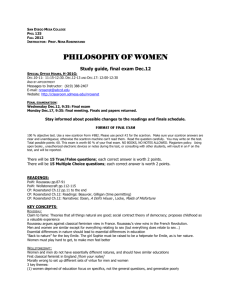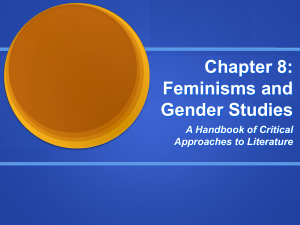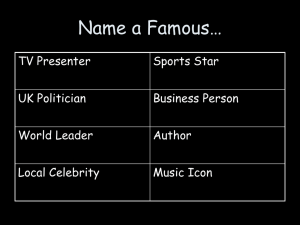Burn Your Bra!
advertisement
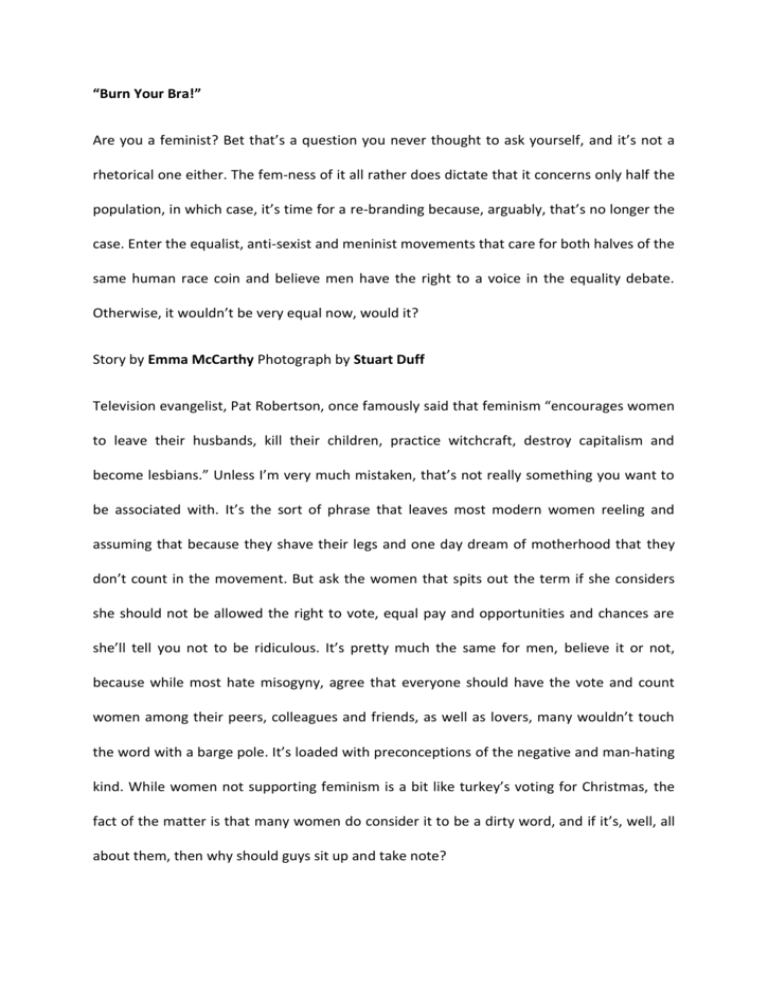
“Burn Your Bra!” Are you a feminist? Bet that’s a question you never thought to ask yourself, and it’s not a rhetorical one either. The fem-ness of it all rather does dictate that it concerns only half the population, in which case, it’s time for a re-branding because, arguably, that’s no longer the case. Enter the equalist, anti-sexist and meninist movements that care for both halves of the same human race coin and believe men have the right to a voice in the equality debate. Otherwise, it wouldn’t be very equal now, would it? Story by Emma McCarthy Photograph by Stuart Duff Television evangelist, Pat Robertson, once famously said that feminism “encourages women to leave their husbands, kill their children, practice witchcraft, destroy capitalism and become lesbians.” Unless I’m very much mistaken, that’s not really something you want to be associated with. It’s the sort of phrase that leaves most modern women reeling and assuming that because they shave their legs and one day dream of motherhood that they don’t count in the movement. But ask the women that spits out the term if she considers she should not be allowed the right to vote, equal pay and opportunities and chances are she’ll tell you not to be ridiculous. It’s pretty much the same for men, believe it or not, because while most hate misogyny, agree that everyone should have the vote and count women among their peers, colleagues and friends, as well as lovers, many wouldn’t touch the word with a barge pole. It’s loaded with preconceptions of the negative and man-hating kind. While women not supporting feminism is a bit like turkey’s voting for Christmas, the fact of the matter is that many women do consider it to be a dirty word, and if it’s, well, all about them, then why should guys sit up and take note? Once you pick apart the accusations, you can see it’s done a fair thwack for King and country. Women can get decent careers and pay a mortgage. Both parents can enjoy a child’s upbringing and spend equal amounts of time at home. We don’t all get married at 18, can divorce if it doesn’t work out, and have the right to an abortion in a hospital instead of a back alley. Even in the face of a lot of ignorance, the core of what feminists actually believe still rings true – that men and women are created equal, and therefore should be paid the same, educated the same, receive the same access to healthcare and the same structural support from society. During the French Revolution, you can bet the aristocracy and Haute Bourgeoisie didn’t want to share their rights with the working class peasants, but the neo-Democracy was established because the fact of the matter was that it would allow more prosperity for all. The same is true of the gender debate, as English reformer, William Hodgson, once put forth to the masses; in the “general struggle” for freedom, it would be “a scandalous omission to overlook the injuries of the fairer part of creation.” In fact, as historians begin to backtrack, more often than not, feminism has been a story of collaboration between the sexes, and, in the words of the poet Tennyson all the way back in 1847, “The Woman’s Cause is Man’s”. It would seem one needn’t be born female to advance women’s interests. So what happened between then and now, that messed things up so much? Let’s examine the back story. The first wave was the suffrage. With a focus on the legalities and basic human rights side of things that pretty much make up our society, they took to the streets to protest for the right to vote, to be educated, to sit in Parliament and to own property. If anyone has an issue with those aspects, then you’re reading the wrong article. May I suggest that you turn instead to more pearls of wisdom from the delightful Pat Robertson? The seventies brought the second wave (tidal wave) which decided to address a set of issues the first wave ‘missed’. Now that the legal obstacles to equality had been overturned, second waver’s blanketed a whole host of issues, ranging from reproductive and family rights to the workplace. The end came when these feminists kept fighting amongst themselves on issues such as sexuality and pornography. Whilst the movement was a necessary aspect of where we stand today in society, what it translated as was a battle of empowerment to women and taking men down a peg or two. It got a bit carried away with itself, in short, and a lot of the main protagonists, admittedly, did have a few issues with men. Things got a bit anti-social, feminism for many equalled misandry, and man and woman underwent a messy, national divorce. After suffering through a depression and fighting a war or two, the honeymoon period was short-lived for most men, and they only had a few years of opportunity stretched out before them before the 60’s turned everything on its head with its “a woman needs a man like a fish needs a bicycle” stance. The eighties, therefore, was a torrid of power suits and career women who were taught that motherhood and housewifery was way below their intellectual capacity. It seems second wave feminists felt that they had the last say in the matter, as opposed to being a movement for freedom, choice and equality. Of course, men went on the defensive, just as women did when the shoe was on the other foot. Most men from this generation were, often unknowingly, taught at an early age to do their part in maintaining the old system that benefitted them (read: acting macho, objectify women and suppress feelings). Men supporting feminism would dismantle a system that worked for them. Even now, and even if they consider themselves to be progressive in every other way, most men have the same relationship with feminism as Clegg does with students. The long standing assumption concerning the demands of second wave feminism is that women should stand apart from men, independently, rather than working with them, and that increased freedom for women must surely lead to a decrease in freedom for men (as if there were only so much freedom available in the world). The argument is that it’s not so much the idea of equal treatment that makes guys feel the need to walk on eggshells, and I would argue that many largely prefer women without their bras on, but rather it’s the fem-Nazi-ism of the situation. It’s the idea that both sexes are equal, but that women are more equal because they were held back for so long by the male dominated culture. Let’s face it, it’s not fun having the gender card thrown in your face whenever you exert a bit of male privilege, and yet a woman can pick and choose when she wants to be treated like an equal, or like a lady. No, it’s not perfect, by any stretch of the imagination, but that’s always going to be the case with unfinished business. What comes now is the third wave feminism movement, or postfeminism, in which women are attempting to shake off some of the stigma of us versus them and re-embrace a bit of good old fashioned domesticity whilst maintaining all the hard-earned advances and liberties. Sort of like the return to homemaking without the imprisonment, a la Nigella Lawson, Sophie Dahl and Kirsty Allsop. After taking the scenic route to get to this enlightened spot, the fact of the matter is you don’t have to be anti-men to be pro-women. Pro-feminist blogs, organisations and websites, written and supported by men, are sprouting up left right and centre, believing that misogyny does not a man make. Outlets such as London Pro-Feminist Men’s Group, Men Engage and XY Online are just some of them, featuring hundreds of articles on key issues such as fatherhood, domestic violence and masculinity, personal stories and links to related websites. XY’s founder, Michael Flood, states “XY is a pro-feminist website. It is intended to advance feminist goals of gender equality and gender justice. XY is intended therefore to encourage men to involve themselves in personal and social change towards gender equality.” What it boils down to, is men don’t want to stop being men any more than women want to stop being women, but that nowadays, feminism has a whole lot more to do with humanism than superiority, and that it shouldn’t be such an ugly, or scary word, for men and women alike. But it seems little has changed since the late 1970’s. The tragic murders of Sian O’Callaghan and Joanna Yeates earlier in the year, led authorities to offer the casually sexist response that women should not walk alone at night, despite the fact that Sian was murdered by a taxi driver, and Joanna by her neighbour. Statistics from the rape crisis centre state that, in the UK, a third of people think that a woman is partially or totally responsible for being raped if she was wearing a short skirt, and nearly a third believe the same to be true if she’s drunk. It’s times like this when the issues of feminism jumps back into the forefront; at times when society considers that women don’t have control over their own bodies and that violence to women is the responsibility of those who suffer it. Quebec Judge, Denys Dionne, commented during a 1989 assault and weapons trial, “Rules are like women, made to be violated”. Obviously it caused outrage. But as a nation, there is the assumption that women shouldn’t dress like prostitutes if they don’t want to be propositioned for sex by a stranger. Yet when we hear a similar comment from policemen, judge or the media, we are utterly shocked and appalled by the discriminative attitude towards the victim. We can only think about it in black-and-white terms. There are no grey areas when it comes to rape or domestic violence for that matter – it’s definitely wrong, and we all know it – but the psychologies surrounding gender equality is one big grey area. I think it was the late American radical feminist, Andrea Dworkin, who put it best when she said; “Men who want to support women in our struggle for freedom and justice should understand that it is not terrifically important to us that they learn to cry; it is important to us that they stop the crimes of violence against us”. And so, in honour of Women’s History Month, let’s have a look at some men who have gone a little further than just leaving the toilet seat down and wear the feminist badge with pride: Six-time Emmy Award and Golden Globe winner, actor, director, screenwriter, author and all-round good guy, Alan Alda. Best known for playing Hawkeye in M*A*S*H, Alda has been a consistently strong and vocal advocator of women’s right and feminism. Alda was dubbed “the quintessential Honorary Woman: a feminist icon” by The Boston Globe in 1976 for his activism on behalf of the Equal Rights Amendment. In his own words... “Begin challenging your own assumptions. Your assumptions are your windows on the world. Scrub them off every once in awhile, or the light won't come in.” TV’s favourite feminist, Phil Donahue. Donohue was Oprah before Oprah, and basically invented the daytime talk show format. He talked about feelings to a primarily female audience and wasn’t afraid of a good gossip. He once wore a skirt for an entire episode. No good guy list would be complete without mentioning Barack Obama. A breath of fresh air to the USA, during his first week in office, Obama lifted the Global Gag Rule, which previously prevented the government from giving funding to ANY family planning organisation worldwide that so much as mentioned ‘abortion’, and the first bill he ever signed was the Lilly Ledbetter Fair Pay Act, which ended the statute of limitations on a woman suing for pay discrimination. In Establishing the White House Council on Women and Girls, Obama highlighted; “[I] want to be clear that issues like equal pay, family leave, child care and others are not just women’s issues, they are family issues and economic issues. Our progress in these areas is an important measure of whether we are truly fulfilling the promise of our democracy for all our people.” He even has his own site – feministsforobama.org. In difficult times, inspiration matters, and it’s not by accident Obama got the vote. Free spirited legend, John Lennon, is best known for Imagine and Give Peace a Chance. Lesser known for the song, “Woman is the N**ger of the World”. Co-written with Yoko Ono, the song goes something like this; “we insult her every day on TV, And wonder why she has no guts or confidence, When she’s young we kill her will to be free, While telling her not to be so smart, we put her down for being so dumb.” In an interview on the Dick Cavett show, where he and Ono performed the song, Lennon explained that he felt women were “the slaves of the slaves” and that “there were a few people that reacted weirdly to it, but usually they were white and male”. Peggy Olsen, Joan Holloway and Betty Draper are three women there to remind us how hard life was for a woman in the 1960’s, so how could their creator be considered anything but a feminist? Matt Weiner, the genius behind Mad Men, is certainly not afraid of sounding off about the workplace discrimination, a hush-hush attitude towards rape, sexual harassment, homophobia, and lack of access to legal abortion that defined the era. The Dalai Lama ... of course. In September 2009, at the International Freedom Award ceremony, he told an audience, “I call myself a feminist. Isn’t that what you call someone who fights for women’s rights?” Yes. Yes, it is. Most recent addition to the fray is Hollywood leading man, Ryan Gosling. Playing lead roles in acclaimed films such as The Notebook and Half Nelson, Gosling recently complained to the Motion Picture Association of America (MPAA) about the NC-17 rating his latest film, Blue Valentine, was given. The crux of the rating was a scene in which Gosling performs cunnilingus on his female co-star, Michelle Williams. The rating would have meant that the picture wouldn’t have played in mainstream movie theatres and newspapers wouldn’t advertise it. In the letter appealing the rating, Gosling states; “You have to question a cinematic culture which preaches artistic expression, and yet would support a decision that is clearly a product of a patriarchy-dominant society, which tries to control how women are depicted on screen. It’s misogynistic in nature to try and control a woman’s sexual presentation of self.” In other interviews, Gosling also questioned why woman-on-woman oral sex scenes were allowed in lesser rated movies, like Black Swan. The resulting press led the MPAA to change the rating to R, and Blue Valentine played in cinemas around the country earlier this year. Get in.

